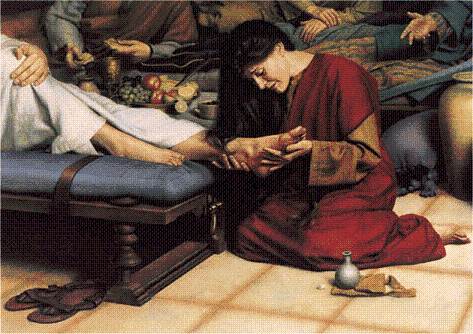Mark 14:1-11 — Now the Passover and Unleavened Bread were two days away; and the chief priests and the scribes were seeking how to seize Him by stealth and kill Him; 2 for they were saying, “Not during the festival, otherwise there might be a riot of the people.”
3 While He was in Bethany at the home of Simon the leper, and reclining at the table, there came a woman with an alabaster vial of very costly perfume of pure nard; and she broke the vial and poured it over His head. 4 But some were indignantly remarking to one another, “Why has this perfume been wasted? 5 For this perfume might have been sold for over three hundred denarii, and the money given to the poor.” And they were scolding her. 6 But Jesus said, “Let her alone; why do you bother her? She has done a good deed to Me. 7 For you always have the poor with you, and whenever you wish you can do good to them; but you do not always have Me. 8 She has done what she could; she has anointed My body beforehand for the burial. 9 Truly I say to you, wherever the gospel is preached in the whole world, what this woman has done will also be spoken of in memory of her.”
10 Then Judas Iscariot, who was one of the twelve, went off to the chief priests in order to betray Him to them. 11 They were glad when they heard this, and promised to give him money. And he began seeking how to betray Him at an opportune time.
Once again, at the beginning of Mark 14, the disciples are found getting in the way of someone trying to honor Christ. In this home and on this occasion, they have proved to be a stumbling block towards this woman. This is always the result of self-promotion and self-preservation, which is why Jesus addressed it head on back in ch.9. We also can do this in our relationships in that our man-centered, self-focused disposition of life can hinder obedience in those with whom we have influence. When the people in our lives are viewed as hindrances to what we want rather than opportunities for ministry, we will be deterrents for their spiritual growth even if it’s only due to our poor example. This especially relates to parenting since, even if a child cannot make the explicit connection, he or she senses the hypocrisy of mom or dad being self-centered, yet still commanding them to be selfless with the other members of the family. It’s certain that how we view Christ directly relates to how we view our influence on others.

